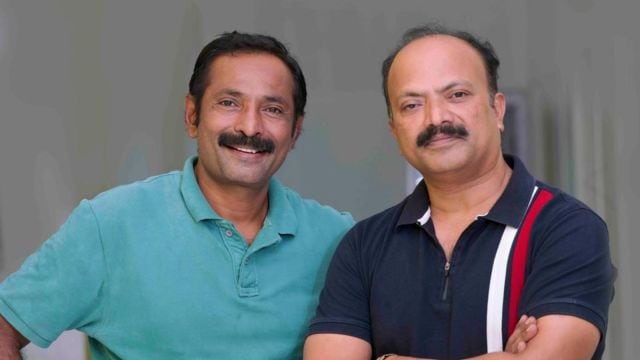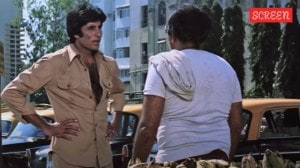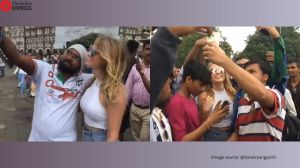Unsung Heroes: How 2 Karnataka men have been leading fight against human trafficking for 34 years
Through their NGO Odanadi Seva Samsthe, K V Stanley and M L Parashuram have taken on human traffickers and exposed the nexus between them and powerful people.
 K V Stanley, 56, and M L Parashuram, 57, are relentless crusaders against human trafficking and all forms of sexual violence against women and children. (Express Photo)
K V Stanley, 56, and M L Parashuram, 57, are relentless crusaders against human trafficking and all forms of sexual violence against women and children. (Express Photo)In the dimly lit corridors of justice and rehabilitation, the names of K V Stanley, 56, and M L Parashuram, 57, resonate as relentless crusaders against human trafficking and all forms of sexual violence against women and children. For 34 years, both have navigated a path filled with danger, threats, and resistance. Despite these challenges, their unwavering commitment has led to the rescue of over 14,600 women and children and the exposure of more than 460 trafficking cases.
From taking on notorious human trafficker Santro Ravi to exposing the alleged sexual offence committed against children by Chitradurga Sri Murugharajendra Mutt chief Shivamurthy Murugha Sharanaru, the duo is in a constant pursuit of ensuring social and legal justice for victims through Odanadi Seva Samsthe, an NGO based in Mysore.
Born in Coorg and raised in Sirsi, Kushalnagar, and Mysore, Stanley was deeply influenced by his father, a veterinary doctor, who instilled in him the value of hard work and humanity over religious dogma. From a young age, he accompanied his father on field visits, witnessing firsthand the struggles of rural Karnataka.
His exposure to socio-political movements began in college, where he was an active participant in student bodies, including the National Service Scheme (NSS), National Cadet Corps (NCC), and the Students’ Federation of India (SFI). Influenced by rational thinkers like Lankesh, Devanoor Mahadeva, and Rajashekar Koti and farmer leaders like Nanjundaswamy, Stanley developed a keen sense of justice and a deep understanding of grassroots struggles.
His law education in Mysore further honed his ability to navigate legal frameworks, preparing him for the battles ahead. “During my college days, I was exposed to Dalit movements and farmer movements and indulged in various community programmes that shaped my perception of society. It exposed me to hard realities. In fact, I also grew up with the principle of work being worship and humanity being religion, which has a bearing on many of what I do today,” said Stanley.
The turning point: encountering Radhamma
In the late 1980s, Parashuram and Stanley worked as journalists for a local paper in Mysore. While reporting for the paper, their transition to activism began with an encounter that changed their lives forever. They met Radhamma, a woman trapped in prostitution, and initially, like many, they believed that financial aid could help her escape the cycle. However, they soon realised that trafficking and prostitution were not just individual struggles but systemic societal failures.
“Society creates prostitutes, uses their bodies, and then never acknowledges them,” Stanley said. Determined to challenge this status quo, he co-founded Odanadi—a movement that started as a small initiative and grew into a formidable force against trafficking, child labor, domestic violence, and exploitation. The focus was not just on rescue but on long-term rehabilitation and empowerment.
“The meeting with Radhamma was a catalyst for the creation of Odanadi Seva Samsthe, which is an organisation dedicated to rescuing and rehabilitating victims of human trafficking and sexual exploitation,” said Stanley.
The Odanadi approach: rehabilitation beyond rescue
At Odanadi, the first step towards rehabilitation begins with food. “Cooking for the rescued children is the first act of care,” said Stanley, emphasising how the smallest gestures can restore dignity. Understanding that survival extends beyond physical rescue, Odanadi created rehabilitation centres—Madilu for girls and Odalu for boys—where survivors receive education, legal support, and vocational training.
“We started off with 14 children who are boys and girls born out of exploitation. We literally picked them up from the streets. We raised funds from friends and other close associates of ours to buy food grains. We went to the rice meat market to buy meat and then cook for the children,” said Stanley.
Over the decades, Odanadi has facilitated the rehabilitation of thousands, with many survivors becoming lawyers, social workers, media professionals, and entrepreneurs.
Stanley and Parashuram have played a key role in multiple operations in Mysuru, exposing human trafficking and child labour. Their raids also highlighted systemic lapses and police complicity.
In a shocking incident in 2011, Odanadi, along with Child Welfare Committee (CWC) officials and the labour department, raided the residence of a police inspector, M N Shashidhar, and rescued a 13-year-old girl forced into bonded labour.
The child, Tanu, was made to quit school and work at the inspector’s house after her father took a loan from him. She was even locked up when the family went out. After the rescue, Stanley ensured Tanu would receive education and care at Odanadi’s shelter.
In 2012, the anti-human trafficking cell from Bengaluru, in coordination with Odanadi, raided a hotel in Kadakola, about 15 km from Mysuru, rescuing 11 women, including three from Bangladesh, from a prostitution racket. The operation, conducted without involving local police, raised concerns about the inaction of the jurisdictional officers. The then Mysuru SP R Dileep, however, claimed it was a joint effort and ordered an inquiry.
A life of struggle and resistance
Stanley and Parashuram’s works have not been without peril. Human trafficking is an industry with deep political and criminal nexuses. Threats, attacks, and defamation lawsuits have been a constant reality. His investigations have exposed kingpins like Santro Ravi, a notorious trafficker with connections spanning from top bureaucrats to law enforcement officials.
“He spent Rs 1 lakh a day on security and hotels. He had been under our radar since 1997. He became famous for his modern way of trafficking. His modus operandi was unique from the rest of them,” Stanley revealed.
Despite legal victories—such as the invocation of the Goonda Act against Santro Ravi—Stanley remains cautious. “The big fish remain protected while smaller offenders get punished. The fight isn’t just legal; it’s moral and systemic,” he said.
The threats have escalated over time. From narrowly escaping attacks in the forest to surviving conspiracies orchestrated by corrupt politicians, Stanley has endured it all. Yet, he remains steadfast. “We don’t belong to any party lines and neither do we succumb to political pressures. Our only allegiance is to social and legal justice.”
Despite his high-risk work, Stanley leads a simple life. His wife, an associate professor in social work at JSS Academy Of Higher Education And Research, has been his pillar of support. He believes social work begins at home, and such intense work is impossible without family.
His belief in humanity over religion is unwavering. “I worship with my work,” he said, rejecting monetary donations from corrupt sources.”We have witnessed firsthand how financial aid alone cannot drive reform. Instead, strong values must accompany action.”
With over 1,000 rescues facilitated through Odanadi, the impact of Stanley and Parashuram is undeniable. Their work has been recognized by international publications such as TIME Magazine, as well as by the Barack Obama administration in the US and the UK Parliament. However, they remain unaffected by accolades, stating, “Recognition doesn’t matter; the real success is when a survivor stands on their own.” The duo continues to passionately fight against exploitation, just as they have for decades.
“We have faith in the Constitution. Justice takes time, but it is inevitable,” Stanley said, as the duo prepares for yet another battle in a war that they refuse to lose.












